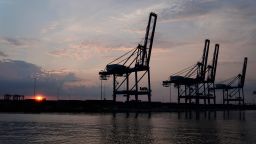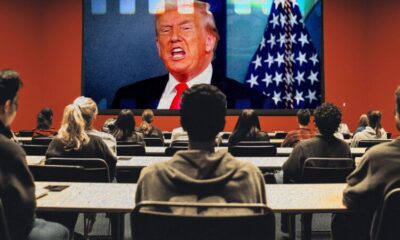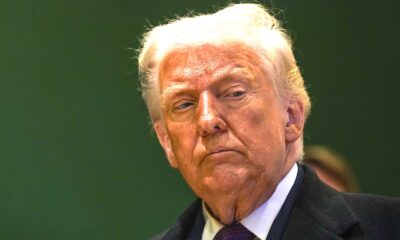Science
Trump’s Tariffs Drive African Nations Toward China’s Embrace

The tariffs imposed by U.S. President Donald Trump are reshaping trade dynamics in Africa, pushing several countries toward increased reliance on China. With tariffs on exports soaring as high as 30%, African nations are confronting a challenging economic landscape. This shift could provide a significant opportunity for China, which has actively courted these countries and is now stepping in to offer support.
According to Nigerian economist Bismarck Rewane, “We (Africa) are going straight into the hands of China.” This statement reflects the growing concern that the tariffs could lead to a deeper dependency on China, which has become the largest bilateral trading partner for several African nations in recent years. Four countries—Libya, South Africa, Algeria, and Tunisia—face some of the steepest tariffs, with charges on exports ranging from 25% to 30%. An additional eighteen countries were subject to a 15% levy, as detailed in a modified tariff package released by the White House.
Opportunities and Challenges Amid Tariff Pressures
Trump’s tariffs are framed as “reciprocal” measures targeting countries with trade deficits with the United States. However, these tariffs are based on the trade balances of these nations rather than the tariffs they impose on U.S. goods. South Africa has contested the 30% tariff on its exports to the U.S., claiming that Trump’s decision does not accurately reflect available trade data.
In response to the negative impacts of U.S. tariffs, China has proposed to alleviate the financial burden on African countries. In June, Chinese officials announced a halt to import charges for nearly all African partners. Researcher Neo Letswalo stated, “There is no other opportunity for African countries to strengthen South-South trade than now,” suggesting that African nations should pivot towards China as a primary trading partner.
Letswalo further noted that America is “gradually forfeiting its global leadership status.” This transition presents an avenue for countries to enhance their autonomy from the U.S., allowing China to emerge as a viable alternative. The absence of a trade agreement between the U.S. and any African nation prior to the tariff implementation highlights the continent’s diminishing priority on the U.S. trade agenda.
Economic Ramifications on African Industries
The ramifications of these tariffs are being felt across Africa, impacting both robust and struggling economies. For example, Lesotho, a nation of over 2 million, is grappling with a 15% tariff that follows a previous 50% levy—one of the highest rates imposed. Prime Minister Samuel Matekane described the tariffs and the cessation of U.S. aid as crippling to industries that previously supported thousands of jobs.
Despite Trump’s characterization of Lesotho as “a country nobody has ever heard of,” trade between the U.S. and Lesotho amounted to over $240 million last year, predominantly in textiles. The government’s declaration of a two-year national state of disaster reflects the urgent need to address the economic fallout from these tariffs.
In South Africa, the Citrus Growers’ Association has expressed anxiety regarding the impending tariffs, warning that “job losses will be a certainty.” With shipments of citrus products ready for export, the association cautioned that high tariffs would result in substantial unsold inventories, further exacerbating economic distress.
Concerns are also surfacing in South Africa’s automotive sector, where businesses are contemplating relocation due to declining profitability. Letswalo emphasized that the tariffs compound existing challenges, worsening an already critical unemployment crisis.
South Africa’s Minister of Mineral and Petroleum Resources, Gwede Mantashe, stated that the country is seeking alternative markets for its goods, indicating a shift in focus toward China, which he highlighted as South Africa’s largest trading partner.
The Risks of Dependence on China
While China’s support may seem advantageous, some experts caution against an overreliance on Beijing. Letswalo warned that shifting dependence from the U.S. to China could pose risks, particularly for emerging industries in Africa. He noted, “If they’re not protected, Chinese products will flood and outcompete them as many African countries are price-sensitive markets.”
Trade relations with China have also been criticized for being imbalanced, often favoring Chinese exports of manufactured goods over African exports of raw materials. The China-Global South Project has observed these discrepancies, highlighting the need for equitable trade agreements.
To mitigate risks, African leaders are encouraged to pursue domestic alternatives, including the swift implementation of the African Continental Free Trade Area (AfCFTA). Although signed in 2020, progress has been slow, with only about 20 of the 55 nations actively participating in the agreement.
Rewane emphasized that U.S. tariffs could ultimately inspire Africa to cultivate economic resilience, advocating for a more inward-looking approach rather than continued dependency on external powers.
As African nations navigate the complexities of international trade and shifting alliances, the dynamics of reliance on major powers like China will play a critical role in shaping the continent’s economic future.
-

 Science1 month ago
Science1 month agoNostradamus’ 2026 Predictions: Star Death and Dark Events Loom
-

 Technology2 months ago
Technology2 months agoOpenAI to Implement Age Verification for ChatGPT by December 2025
-

 Technology7 months ago
Technology7 months agoDiscover the Top 10 Calorie Counting Apps of 2025
-

 Health5 months ago
Health5 months agoBella Hadid Shares Health Update After Treatment for Lyme Disease
-

 Health5 months ago
Health5 months agoAnalysts Project Stronger Growth for Apple’s iPhone 17 Lineup
-

 Technology5 months ago
Technology5 months agoElectric Moto Influencer Surronster Arrested in Tijuana
-

 Science2 months ago
Science2 months agoBreakthroughs and Challenges Await Science in 2026
-

 Education5 months ago
Education5 months agoHarvard Secures Court Victory Over Federal Funding Cuts
-

 Health5 months ago
Health5 months agoErin Bates Shares Recovery Update Following Sepsis Complications
-

 Science4 months ago
Science4 months agoStarship V3 Set for 2026 Launch After Successful Final Test of Version 2
-

 Technology7 months ago
Technology7 months agoMeta Initiates $60B AI Data Center Expansion, Starting in Ohio
-

 Technology6 months ago
Technology6 months agoDiscover How to Reverse Image Search Using ChatGPT Effortlessly





















